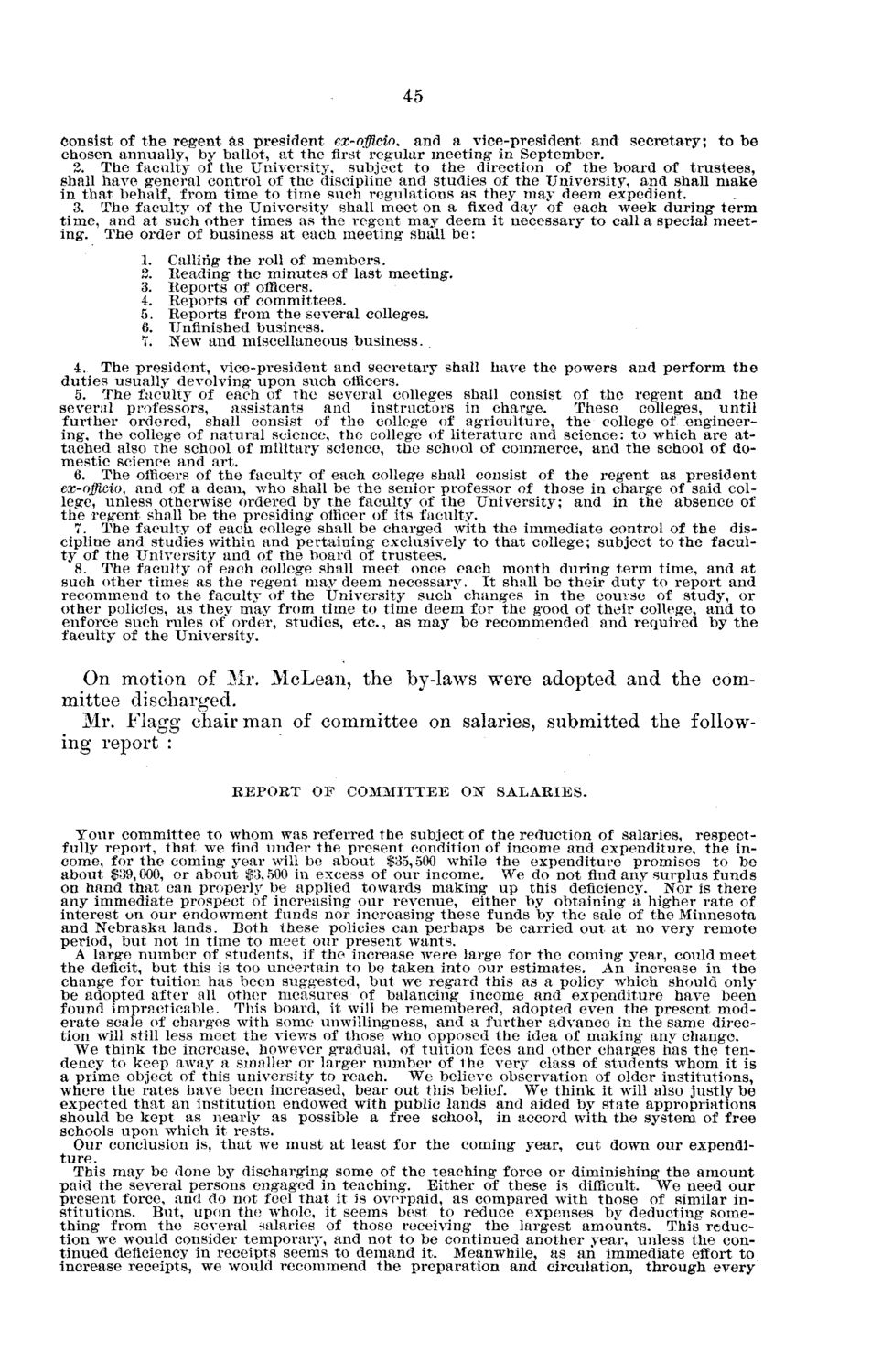| |
| |
Caption: Board of Trustees Minutes - 1878
This is a reduced-resolution page image for fast online browsing.

EXTRACTED TEXT FROM PAGE:
45 Consist of the regent as president ex-offlcio, and a vice-president and secretary; to be chosen annually, by ballot, at the first regular meeting in September. 2. The faculty of the University, subject to the direction of the board of trustees, shall have general control of the discipline and studies of the University, and shall make in that behalf, from time to time such regulations as they may deem expedient. 3. The faculty of the University shall meet on a fixed day of each week during term time, and at such other times as the regent may deem it necessary to call a special meeting. The order of business at each meeting shall be: 1. Calling the roll of members. 2. Reading the minutes of last meeting. 3. Reports of officers. 4. Reports of committees. 5. Reports from the several colleges. 6. Unfinished business. 7. New and miscellaneous business. . 4. The president, vice-president and secretary shall have the powers and perform the duties usually devolving upon such officers. 5. The faculty of each of the several colleges shall consist of the regent and the several professors, assistants and instructors in charge. These colleges, until further ordered, shall consist of the college of agriculture, the college of engineering, the college of natural science, the college of literature and science: to which are attached also the school of military science, the school of commerce, and the school of domestic science and art. 6. The officers of the faculty of each college shall consist of the regent as president ex-offlcio, and of a dean, who shall be the senior professor of those in charge of said college, unless otherwise ordered by the faculty of the University; and in the absence of the regent shall be the presiding officer of its faculty. 7. The faculty of each college shall be charged with the immediate control of the discipline and studies within and pertaining exclusively to that college; subject to the faculty of the University and of the board of trustees. 8. The faculty of each college shall meet once each month during term time, and at such other times as the regent may deem necessary. It shall be their duty to report and recommend to the faculty of the University such changes in the course of study, or other policies, as they may from time to time deem for the good of their college, and to enforce such rules of order, studies, etc., as may be recommended and required by the faculty of the University. On motion of Mr. McLean, the by-laws were adopted and the committee discharged. Mr. Fiagg chair man of committee on salaries, submitted the following report : REPORT OF COMMITTEE ON SALARIES. Your committee to whom was referred the subject of the reduction of salaries, respectfully report, that we find under the present condition of income and expenditure, the income, for the coming year will be about $35,500 while the expenditure promises to be about $39,000, or about $3,500 in excess of our income. We do not find any surplus funds on hand that can properly be applied towards making up this deficiency. Nor is there any immediate prospect of increasing our revenue, either by obtaining a higher rate of interest on our endowment funds nor increasing these funds by the sale of the Minnesota and Nebraska lands. Both these policies can perhaps be carried out at no very remote period, but not in time to meet our present wants. A large number of students, if the increase were large for the coming year, could meet the deficit, but this is too uncertain to be taken into our estimates. An increase in the change for tuition has been suggested, but we regard this as a policy which should only be adopted after all other measures of balancing income and expenditure have been found impracticable. This board, it will be remembered, adopted even the present moderate scale of charges with some unwillingness, and a further advance in the same direction will still less meet the views of those who opposed the idea of making any change. We think the increase, however gradual, of tuition fees and other charges has the tendency to keep away a smaller or larger number of the very class of students whom it is a prime object of this university to reach. We believe observation of older institutions, where the rates have been increased, bear out this belief. We think it will also justly be expected that an institution endowed with public lands and aided by state appropriations should be kept as nearly as possible a free school, in accord with the system of free schools upon which it rests. Our conclusion is, that we must at least for the coming year, cut down our expenditure. This may be done by discharging some of the teaching force or diminishing the amount paid the several persons engaged in teaching. Either of these is difficult. We need our present force, and do not feel that it is overpaid, as compared with those of similar institutions. But, upon the whole, it seems best to reduce expenses by deducting something from the several salaries of those receiving the largest amounts. This reduction we would consider temporary, and not to be continued another year, unless the continued deficiency in receipts seems to demand it. Meanwhile, as an immediate effort to increase receipts, we would recommend the preparation and circulation, through every
| |